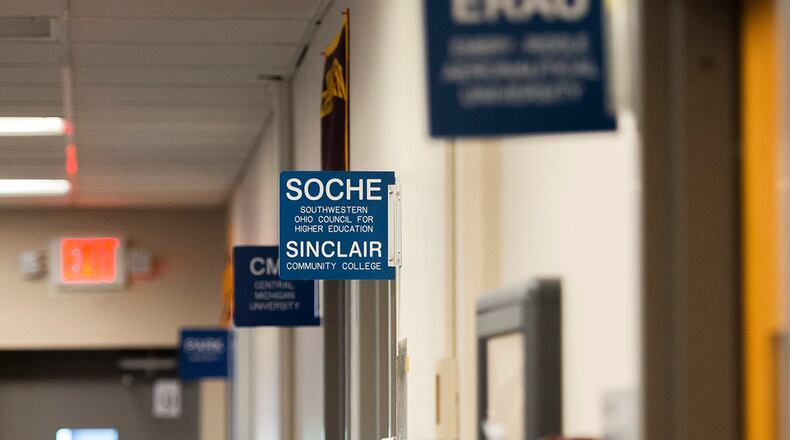That’s why the folks at the 88th Force Support Squadron’s Education Office work so hard to help active-duty, Guard and Reserve Airmen — along with civilian personnel — find education options and funding that will work for them.
“Active-duty Air Force (and) activated Guard/Reserve members should contact the base Education Office for tuition-assistance eligibility,” said Jason Robertson, an Education Office services specialist. “We have four on-base colleges that are capable of offering online and on-site, in-person classes. In addition, classes may be offered at a unit upon request and with prior coordination.”
Another benefit for students is the ability to attend schools not actually here in the local area, he added.
The Education Office facilitates classes through local options such as Sinclair Community College. But there’s also Park University, whose main campus is in Parkville, Missouri, as well as Central Michigan University in Mount Pleasant, Michigan. Embry-Riddle Aeronautical University’s main campus is in Florida.
Each of these schools has an office here at its “Wright-Patt campus,” giving students the ability to talk with a representative face-to-face.
Having classes offered on base adds a level of convenience for service members that may not be as easily found elsewhere.
“One major benefit of having classes offered on base is the convenience of … not having to travel to a separate location to attend class,” Robertson said. “Additionally, you are partnering with colleges that understand the military mission while taking classes with your peers.”
Senior Master Sgt. Jamie Pope, manager of Individual Reservist Operations for Headquarters Reservist Readiness Integration Organization and a college student on base, agrees.
“Being able to meet with someone face-to-face is really important,” Pope said. “It offers more transparency and the ability to get a better understanding of what the college or university has to offer me as a student.
“We are creatures of habit. Being able to take classes here in places that I know and with people that I know is a great benefit. They understand the mission and have a better understanding of what I’m going through, plus being able to attend on base allowed me to get to class much faster than going in the community.”
The goal is to enable self-development and help improve the critical-thinking skills of Airmen around the installation. The schools also serve as recruiting and retention initiatives by allowing Airmen to get an education without having to leave the base.
“Face-to-face communication with Airmen that walk in, and being able to explain to them what we offer, is always a better option than doing it over the phone or online,” said Amy Koci, the Wright-Patt Campus Center director for Park University. “We are able to get a better understanding of what they are looking for, review degree plans, figure out what credits they have that will transfer in and answer questions while they are here.”
Degrees that can be earned on base from these schools include a Master of Science in administration, associate or Bachelor of Science in technical management, Master of Science in aeronautics; and associate or bachelor’s in management, logistics, information and computer science, criminal justice administration and social psychology.
“In some cases, military members who have to PCS (permanent change of station) may find one or more of our on-base colleges at their new duty location,” Robertson said. “In fiscal year 2021, we had over 500 active-duty, Guard and Reserve Airmen utilize our on-base schools. This doesn’t even account for our (Department of Defense) civilians, dependents or military members from other branches of service.”
The schools and programs offered on base are looked at every five years by the Education Office to ensure the meet the installation’s community education goals. A copy of the recent survey is available through the Air Force Virtual Education Center. This is also where military members and civilians can go to take the survey and provide input or suggestions for offering new degree programs.
Anyone with questions about Wright-Patt’s education programs should contact the base Education Office at 937-904-4801, by email at wpafbeducation@us.af.mil or through the Air Force Virtual Education Center website.
About the Author
